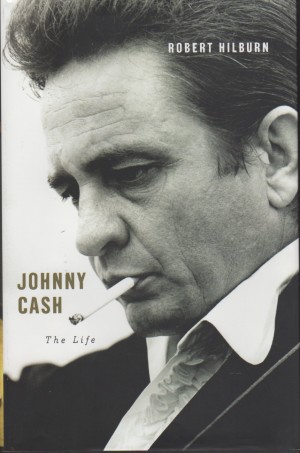
Johnny Cash: The Life by Robert Hiburn (2013. Little Brown. ISBN 9780316194754)
Like many kids of the 1950s, I grew up catching bits and pieces of the Man in Black’s life over the six decades he was one of country music’s icons. I remember my pal Bruce Patterson playing an 8 track of Johnny’s Folsom Prison Blues over and over and over again in the early 1970s in Bruce’s 1960s vintage Dodge (back when it wasn’t a classic car; just an ordinary Dodge). But I wasn’t a country music fan and I didn’t stop and listen long enough to appreciate the crossover appeal of Cash’s lyrics and melodies. Despite my fondness for wordsmiths like Neil Young, Bruce Springsteen, Mary Chapin Carpenter, and Bob Dylan, I never placed Cash in that same vein. Hell, up until a few years ago, the only album I owned with Johnny singing and playing on it was the original Highwaymen collection (Waylon Jennings, Kris Kristopherson, Willie Nelson, and Cash).
I do recall, in moments of early teenaged boredom during the Vietnam War, sitting down on the davenport in the den of our tract house an evening or two to watch the old Johnny Cash variety show on television. But I wouldn’t classify myself as a fan. In fact, I wasn’t even mildly interested in the man or his music. That all changed when I saw Walk the Line, the movie made after Johnny and his beloved second wife, June Carter Cash, passed away. That movie compelled me to sit up and take notice of Cash as a man and a musician. Not long after watching the flick, I stumbled onto a discount copy of a CD memorializing a VH1 Storytellers session featuring Cash and Willie Nelson. Just two old stalwarts of the country music scene sitting on stools, plucking acoustic guitars, playing their songs. Magic. I was hooked. So when one of my sons (or my wife, I can’t recall) gave me Hilburn’s quintessential biography of the Man in Black, I dove in. And I am surely glad I did.
The demons that Joaquin Phoenix so expertly brought to life on the screen in Walk the Line, playing opposite to Reese Witherspoon in the role of June (she won an Oscar for her work) pale in comparison to the tortured soul Hilburn exposes in this biography. One was, upon watching the final credits of the film, left with the impression that, once Johnny and June got together, the Man in Black substituted true love for the amphetamines he was popping like M&Ms. In fact, while Cash did manage brief periods of sobriety from the late 1960s forward, he was never able to totally escape the allure and palliative effects of pills. Up until the day he died, folks around him continued to worry over the amount and extent of his reliance on prescription medications to keep Johnny upright and moving forward. This revelation, one quite unexpected given the message of the movie, is aligned with another storyline that Hilburn weaves in contrast to the legend depicted in the film. Again, my view of the Cash/Carter love story was wrapped up in the notion, presented convincingly in the movie, that Cash pursued Carter; that it was his undaunted quest for love that eventually won her over. Not true. June Carter Cash, at least according to the author, despite reservations about Johnny’s drug use, was every bit as interested in leaving her husband for the singer as Cash was interested in leaving his wife and four daughters for his new-found love. The level of anguish and torture that both Cash and Carter, along with their families, went through during the breakup of two marriages, as well as the decades of unproductive session and recording work that followed Cash’s early fame as a Sun Studios artist are detailed here, exposing a pained and flawed, yet humble and God-fearing soul far more complex than a two hour movie could ever hope to capture.
How good is Hiburn’s work in this book? Well, he convinced me, during the last segment of the tale, where he lovingly writes of Johnny’s resurgence as a songwriter and bedrock of folk, rock, country, and crossover music under the guidance of 21st century music impresario and producer Rick Rubin, to immediately buy two of the American albums that Rubin cut with Cash shortly before Carter, and then Cash, passed on. The author’s depiction of the resurgent power of Johnny Cash’s lyricism, and his ability to make other songwriters’ work his own, is best endorsed by the fact that at least two of the records Rubin made with Cash won Grammy awards. In addition, video critics heralded the music video of Cash performing “Hurt” (a tune written by Nine Inch Nails front man, Trent Reznor) as the best music video ever made.
Don’t take my word for it. Watch the video yourself at:
http://www.youtube.com/watch?v=3aF9AJm0RFc
then buy the book and be prepared for one great read featuring one of America’s most troubled, yet talented musicians.
5 stars out of 5.
Peace.
Mark


